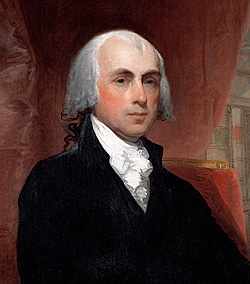Madison did not advocate abolishing state governments, but he did argue that he saw no reason why the people would be any less free as citizens of one great republic than thirteen small ones. The biggest objection, he believed, against allowing the federal government to assume all local authority was not that it would be oppressive, but simply that so much authority would be too much for it to handle.
Madison had a taste for reasoning that others might consider paradoxical. It was generally assumed at the time that popular government was dangerously prone to faction, and that it could only succeed in a small territory.* Madison proposed just the opposite -- that popular government would be more stable over a large territory because dangerous factions would likely only occur in one small area at a time. When small states feared that a strong central government would be dominated by large states, Madison answered small states needed a strong central government to protect them from large states and, indeed, that the stronger the central government, the less they would have to fear from large states. He made a similar argument in favor of the Virginia Plan over the New Jersey Plan. Small states were better off giving the federal government direct power over individuals than power to coerce states. Power over individuals would obviate the need to coerce states. And if the federal government did coerce states, it would be more likely to take on small ones than large.
Madison was, with James Wilson, the fiercest opponent of giving states equal representation in the Senate. He argued that not even small states considered proportional representation in both houses unjust, only unsafe. States did not need equal representation in the Senate because the government would act on individuals instead of states. It would be unjust because it would allow a minority to defeat the majority. As a compromise, Madison proposed to have representation in proportion to population when the government acted on individuals directly, and give each state an equal vote when the general government acted on states as units. Since he did not believe the general government would ever act on states as units, this concession was meaningless. Madison did not record what he did in the private conference during which the Great Compromise was reached, but he did say that some of the representatives of large states were ready to see the convention fail rather than yield on this point. Given his general record, one suspects that Madison was among their number.
Madison was also the leading advocate of giving Congress a veto on all state laws that contradicted federal law. He believes such a veto was necessary for the federal government to protect itself against state encroachments. Like giving the central government direct power over individuals, Madison saw the veto as a way of avoiding the need to use force against a state. Merely making federal law supreme over state law would give the power to the courts to strike down incompatible state laws, but Madison believed the process would be too slow and cumbersome.** Many people raised the obvious objection that forcing state laws to be approved by Congress would create undue delays, especially in the case of emergencies. Madison proposed some "emanation" of federal power into the states to give temporary approval in cases of emergency. He did not say what form this "emanation" would take.
Madison also favored giving Congress power to regulate federal elections, charter corporations in cases in which the states were not competent and establish a national university. He favored federal control of the state militia and federal appointment of militia generals (though not lower officers).
_______________________________________________________
*The classic example was Rome, in which popular government did, indeed, flourish so long as it covered only a small territory, but ran into serious problems when it became too large.
**This fear has proven essentially sound. Many times, even to this day (say, with marijuana laws), states have made laws that contradict federal law. The federal government has had little middle ground between allowing the act of defiance to stand and the use of force.
*The classic example was Rome, in which popular government did, indeed, flourish so long as it covered only a small territory, but ran into serious problems when it became too large.
**This fear has proven essentially sound. Many times, even to this day (say, with marijuana laws), states have made laws that contradict federal law. The federal government has had little middle ground between allowing the act of defiance to stand and the use of force.


No comments:
Post a Comment